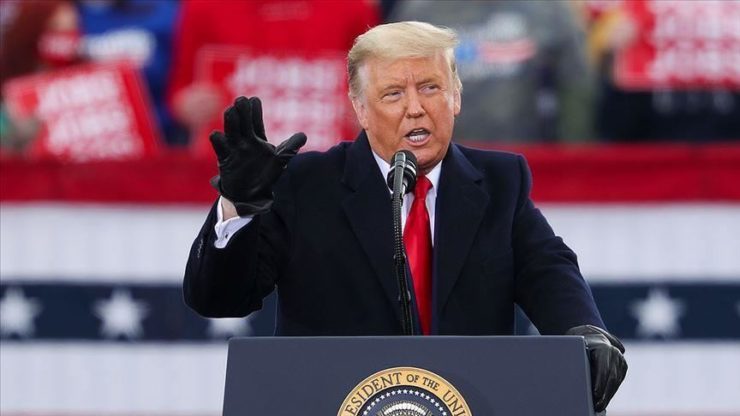
Biden’s flowed foreign policy, i.e., its support for Ukraine and Israel’s genocidal war on Palestine, and Trump’s populism have seemingly combined into a force that might bring the former president to the White House. The possibility is no longer distant. As some latest data shows, Biden is already trailing Trump in terms of popularity. Several key states, including Arizona, Georgia, and Michigan have already swung to Trump, which means that Trump could ultimately end up winning with 277 votes. For the Republicans, Trump himself, and his voters, the victory of Donald Trump – who is facing dozens of criminal charges – will be nothing short of a marvelous turnaround of events, but not everyone is having such excitement. Most European states are already showing very strong signs of discomfort. Russia, on the other hand, sees an opportunity to settle outstanding geopolitical issues if Trump wins. China, on the other hand, is not particularly enthusiastic about Trump’s return, but Beijing does see a different opportunity in Trump’s return to re-establish itself in Europe on a strong footing.
Realising the growing sense of fear in Europe, China’s top diplomat Wang Yi recently reminded his European counterparts that no matter how the world might change, China will be “consistent and stable” – a “force for stability”. These remarks were made at the latest Munich Security Conference, where Wang also emphasised that Europe and China must “stay clear of geopolitical and ideological distractions” and work together.
China was prompted to say this because it expects, as Trump has already pointed out on several occasions, that he will impose more restrictions and raise more tariffs on China than the Biden administration so far has. Trump, in short, intends to expand the so-called ‘trade war’ and impose an arbitrary ‘de-coupling’ with China by possibly raising tariffs by 60 percent. “We have to do it”, Trump said in an interview with Fox News.
He is equally targeting Europe. Trump’s former National Security Advisor John Bolton has indicated that Trump would kill the North Atlantic Treaty Organization if reelected. In fact, Trump recently said in a campaign speech that he would encourage Russia “to do whatever the hell they want” to anyone who is not meeting the treaty’s military spending guidelines. Even when he was president, Trump frequently raised this issue of proportional spending with Washington’s European allies, but Europe continues to under-spend on defense. Europe now fears that Trump’s return will not only bring financial costs, i.e., more defense spending, but it will also leave their security vulnerable. Of course, Moscow does not intend to ‘occupy’ Europe, but Trump’s rivals are already portraying his remarks as a potential invitation to Russia to attack Europe.
Whereas such framing undermines Russia’s legitimate security concerns vis-à-vis the Biden administration’s push to expand NATO to Ukraine and permanently encircle Russia, it remains that Trump’s arrival and the possibility of him downsizing US military support for Europe/NATO could create an opening for the Russia-Ukraine conflict to be resolved diplomatically. Russia’s recent gains in Ukraine are making it even more necessary. This is on top of the fact that Donald Trump has already highlighted his intentions to ‘settle’ the war as soon as he is reelected.
It means that, come 2025, Europe’s biggest fear might no longer be Russia, but Donald Trump. As a recent report in The Washington Post said, many in Europe do not have much hope left in the presidential race.
China has similar concerns about a potential ‘de-coupling’ with the US. For Beijing, therefore, if Trump goes for a ‘trade war’ against China and if he breaks out of NATO – which is also ‘de-coupling’ in terms of security – both Europe and China must ‘couple up’. China sees for itself two key roles.
First, trade between China and Europe is a ‘win-win’ for both. Given Trump’s past behaviour when he pulled the US out of several multilateral arrangements, Trump’s arrival will put a question mark on the future of the India-Middle East-European corridor, leaving Europe with China to settle. China and the EU leaders are also discussing the importance of “balanced” trade ties. This has received increased traction in the wake of the ‘Trump factor’.
Second, China could act as a bridge between Europe and Russia to mediate and help normalize their ties. In the absence of the US security umbrella and the fact that Europe may still have its concerns vis-à-vis Russia, Europe cannot probably find a better interlocutor than China. In fact, this was implicit in the message that Wang Yi conveyed at the Munich conference.
Turning the attention to the Palestinian issue, which Wang characterized as the “longest injustice in the world,” China’s top diplomat said Beijing could be a force in mediating hotspot issues. To demonstrate Beijing’s mediation skills, Wang also cited Beijing’s role in facilitating the resumption of diplomatic relations between Saudi Arabia and Iran last year.
Will Europe be willing to accept China in that role is, however, a moot question. A lot depends upon how relationships will evolve in the future within the context of a Trump presidency. But both Europeans and the Chinese are closely monitoring US politics, and both have reached similar conclusions so far: Donald Trump is all set to reclaim the position he lost in 2020. This will inevitably have major policy repercussions. Where it could potentially resolve the Russia-Ukraine conflict and even bury the NATO expansion agenda for now, it could also push Europe to position itself away even more vigorously from Washington vis-à-vis crucial global policy matters, thus reinforcing multilateralism. If the US were to distance itself from NATO, Europe could retaliate by integrating closely with China to defeat Washington’s geopolitics of de-coupling from China.
Salman Rafi Sheikh, research-analyst of International Relations and Pakistan’s foreign and domestic affairs, exclusively for the online magazine “New Eastern Outlook”